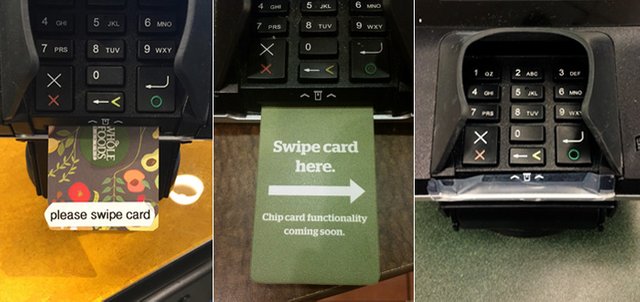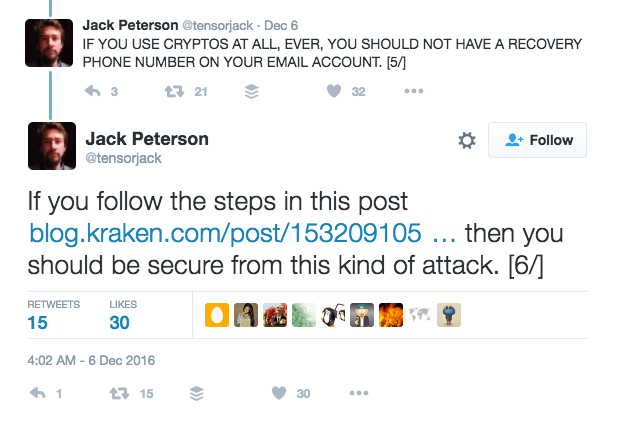🔊 NEW! Neocash Radio Ep185: Credit Cards Chip Away Security, Italy Rocks the Eurozone Boat, Amazon’s Automated Future
Credit Card chips not all they are promised. Amazon wants you to just sit back and relax while robots do all the work. Italy says no to Constitutional Reform. Google set to own your soul and be using 100% green renewable energy by 2017. Bo Shen has his phone recovery used against him in hack. FinTech firms in the US may see a streamlined charter process available soon.
All this and more on the Neocash Radio podcast episode 185 here on Wednesday December 7th, 2016!
Stream this podcast episode:
Tune in to Neocash Radio every Wednesday night and
RETWEET ALL THE THINGS @NeocashRadio!
RETWEET ALL THE THINGS @NeocashRadio!
| Traditional Markets | Crypto Markets |
| Gold $1,174 | Bitcoin (BTC) $767 |
| Silver $17.09 | Litecoin (LTC) $3.63 |
| Oil $49.84 | Zcash (ZEC) $53.71 |
| Dow Jones 19,549 points | Ethereum (ETH) $8.40 |
| 30Y UST Yield 3.026% | DASH $8.76 |
| Euro (EUR) $1.08 | Monero (XMR) $7.69 |
| Chinese Yuan (CNY) $0.145 | Augur REP $3.17 |
| British Pound (GBP) $1.26 | 1 Doge = 1 Doge |

Credit card chips cause headaches and are actually very vulnerable at the Point of Sale
CNNMoney broke the story that the chip added to credit cards that is supposed to make them more secure is not so secure after all. The chips are called EMV, which stands for Europay, Mastercard, and Visa, and at it’s core it consists of a proprietary system that not much is known about. When you use the magnetic strip of a card that has a chip the machine is supposed to prompt you to use the chip reader instead. Security Researchers at tech company NCR found that the magnetic strip can be rewritten to show that the card has no chip -- at this point the chip is bypassed and the card is able to counterfeited.This is not the only glaring flaw, most payment devices and card readers are transmitting your transactions in plain text. Most machines come with point to point encryption but it is not turned on by default and vendors want to charge extra to set that up causing many shop owners to forego the additional expense. Indeed, the new chip reading machines have already cost the retail industry an estimated $25 Billion dollars -- all for a chip that is already defeated. As of October only about 25% of the United States’ estimated 8 Million merchants have upgraded to the new machine. Furthermore Visa and Mastercard have delayed the Gas Pump deadline from 2017 to 2020 citing the unique challenges faced by the outdoor machines.
Merchants that fail to meet the upgrade deadline will be on the hook for all fraudulent transactions that occur at their establishment. These strong arm tactics have inspired lawsuits that claim the Credit Card companies are shifting the costs of identity theft to merchants.
Amazon's grocery store of the future: no cashiers, no registers, and no lines
The very first Amazon Go—a new type of grocery store with no cashiers—is set to open in Seattle early next year. Amazon internal plans reveal that the online retail giant plans to open as many as 2,000 of these stores across the United States. (For reference, brick-and-mortar grocery chain Kroger has around 2,600 locations.)UPDATE: "We have no plans to open 2,000 of anything. Not even close." —Amazon spokeswoman Pia ArthurAmazon Go shoppers would use an app on their phone to keep track of items in their cart and then just walk out the door when they’ve finished shopping. Their Amazon account will automatically be billed.
It will be interesting to see how competitors react and how this continued shift toward automation and robotic replacements will affect prices and employment. Smaller businesses will have difficulty competing with the convenience and lower prices this technology will allow. Regarding employment, there were 856,850 cashiers working at grocery stores around the United States as of May 2015. Where will all these jobs go?
Amazon has of course also made headlines for testing drone delivery technology, which also brings up freight and transportation. Where will the 826,510 package delivery driver jobs go after autonomous technology replaces them? And where will the 3.5 million professional truck drivers go once autonomous freight carriers start saving the industry an estimated $168 billion annually? (No hourly wage, increased fuel efficiency, less downtime, fewer accidents…)
Italians Vote No on Constitutional Referendum, PM Matteo Renzi Resigns
A referendum would have altered much of Italy’s 68 year old Constitution. Created after the fall of Mussolini, the constitution sought to divvy up power among many and make it a deliberate process to change laws. The referendum put forth to voters would have done much to consolidate power into the hands of a few. For example the Senate would have been neutered and relegated to a consulting role with fewer members, thus giving most legislative power to the lower house. Military power would have been consolidated into a national system rather than the provincial system that is now in place.
The current system is far from perfect with the Senate and the Italian government overall known for delays, waste, and corruption. We mentioned the scandals surrounding Italian banks in a previous episode. Italy’s per capita income is the second worst in Europe after Greece and the national debt is 130% GDP. And that GDP isn’t going to be increasing with as much as 20% leaving the country.
The “No” vote was led by the Five Star movement, an anti-establishment group led by comedian Beppe Grillo. The group is pushing a referendum of their own that calls for a return to the Italian national currency, the Lira, and the rejection of the Euro.
Google to be powered 100% by renewable energy from 2017
Google has announced that its massive data centers and the offices for its 60,000+ employees will be fully powered by renewable energy & renewable energy credits beginning in 2017. Google is already the world’s largest corporate buyer of renewable electricity; last year, it purchased 44% of its power from wind and solar farms. (Google got a total of 5.7 terawatt hours of renewable energy in 2015; for reference, the total amount generated by ALL solar panels in the UK over the same year was 7.6 terawatt hours.)
“The company’s 100% renewable energy does not mean Google is getting all its energy directly from wind and solar power, but that on an annual basis the amount it purchases from renewable sources matches the electricity its operations consume.”Google has been working to reach 100% renewable energy for close to five years, citing hurdles while navigating and negotiating complex power purchase agreements. “It’s complicated, it’s not for everyone: smaller companies will struggle with the documents,” explains Google’s EU energy lead Marc Oman. “We are buying power in a lot of different jurisdictions, so you can’t just copy and paste agreements.”
Google doesn’t share exact figures on its data centers’ energy usage, but says as a company that it’s responsible for 0.01% of global electricity use, and they acknowledge that much of that comes from its data centers. To help combat this, Google has used AI and machine learning to reduce energy usage at select data centers by 15% in early experiments, which they now plan to deploy in all of their data centers.
Bo Shen—early Augur & Ethereum supporter—gets hacked via social engineering; ETH & REP stolen from his account & dumped
Bo Shen—an early supporter of the Augur prediction market and Ethereum—was apparently hacked via social engineering. Though we’ve seen no official confirmation from Shen, his Twitter account was apparently hacked and sending out rogue messages. The reports of the hacking came from Augur developer Jack Peterson via Twitter, who also claimed that several other people associated with Augur were also targeted.
Several discussions on Reddit suggest that the hacker could have gotten control of Bo’s account by fraudulently claiming to be him and getting his cell phone carrier to port the number to another device. Once gaining control of his phone number, the hacker could then say they “forgot their email password” and have the recovery code sent to their phone. Once they’ve gotten in the email, it becomes increasingly easy to gain access to other accounts, and in this case, it appears that cryptocurrency wallets were emptied.

Augur’s Jack Peterson was quick to note that this was not a failing of Augur or Ethereum, but instead a human that played into social engineering and a lapse in preventative security measures.
FinTech start-ups will need to get a “charter” license to bank
The United States’ top bank regulator, the Office of the Comptroller of the Currency (OCC), said that it would begin issuing national bank charters to online lenders, payment companies, and other financial technology (“FinTech”) firms.
This “charter license” will allow FinTech firms to offer some of the services typically reserved for banks on a national level, without needing to navigate as many individual state licensing and lending laws. Governments have continued to advance more slowly than technology, and this may allow fintech companies to develop more quickly, but it’s likely a bait-and-hook technique that will end up miring the firms in as much red tape and bureaucratic bloat as the banks before them.
If you want a glimpse into the future, check out who the Office of the Comptroller of the Currency appointed as so-called “Chief Innovation Officer” for their “Office of Innovation” that they formed in late October -- Beth Knickerbocker. Probably not a name you’d recognize, but according to her résumé, she’s previously worked as counsel for the OCC's Legislative and Regulatory Activities Division, and as Vice President of the Senior Regulatory Counsel for the American Bankers Association.
And at a panel earlier this year touting so-called “responsible innovation” in the FinTech sector, Knickerbocker made clear to attendees that she wasn’t planning on making any room for financial technology that operates outside of the banking system’s claws: “We want the federal banking system to remain vibrant and capable.”
Does that scream “innovation” to you?
Disclaimer: I am just a bot trying to be helpful.